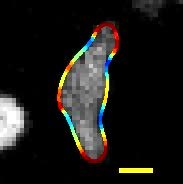
Photo from wikipedia
An isolated positive wedge disclination deforms an initially flat elastic sheet into a perfect cone when the sheet is of infinite extent and is elastically inextensible. The latter requires the… Click to show full abstract
An isolated positive wedge disclination deforms an initially flat elastic sheet into a perfect cone when the sheet is of infinite extent and is elastically inextensible. The latter requires the elastic stretching strains to be vanishingly small. In this paper, rigorous analytical and numerical results are obtained for the disclination-induced deformed shape and stress field of a bounded Föppl-von Kármán elastic sheet with finite extensibility, while emphasizing the deviations from the perfect cone solution. In particular, the Gaussian curvature field is no longer localized as a Dirac singularity at the defect location whenever elastic extensibility is allowed and is necessarily negative in large regions away from the defect. The stress field, similarly, has no Dirac singularity in the presence of elastic extensibility. However, with increasing Young's modulus of the sheet, while keeping the bending modulus and the domain size fixed, both of these fields tend to develop a Dirac singularity. Noticeably, in this limiting behavior, inextensibility eludes the bounded elastic sheet due to persisting regions of nontrivial Gaussian curvature away from the defect. Other results in the paper include studying the effect of specific boundary conditions (free, simply supported, or partially clamped) on the Gaussian curvature field away from the defect and on the buckling transition from the flat to a conical solution.
Journal Title: Physical review. E
Year Published: 2021
Link to full text (if available)
Share on Social Media: Sign Up to like & get
recommendations!